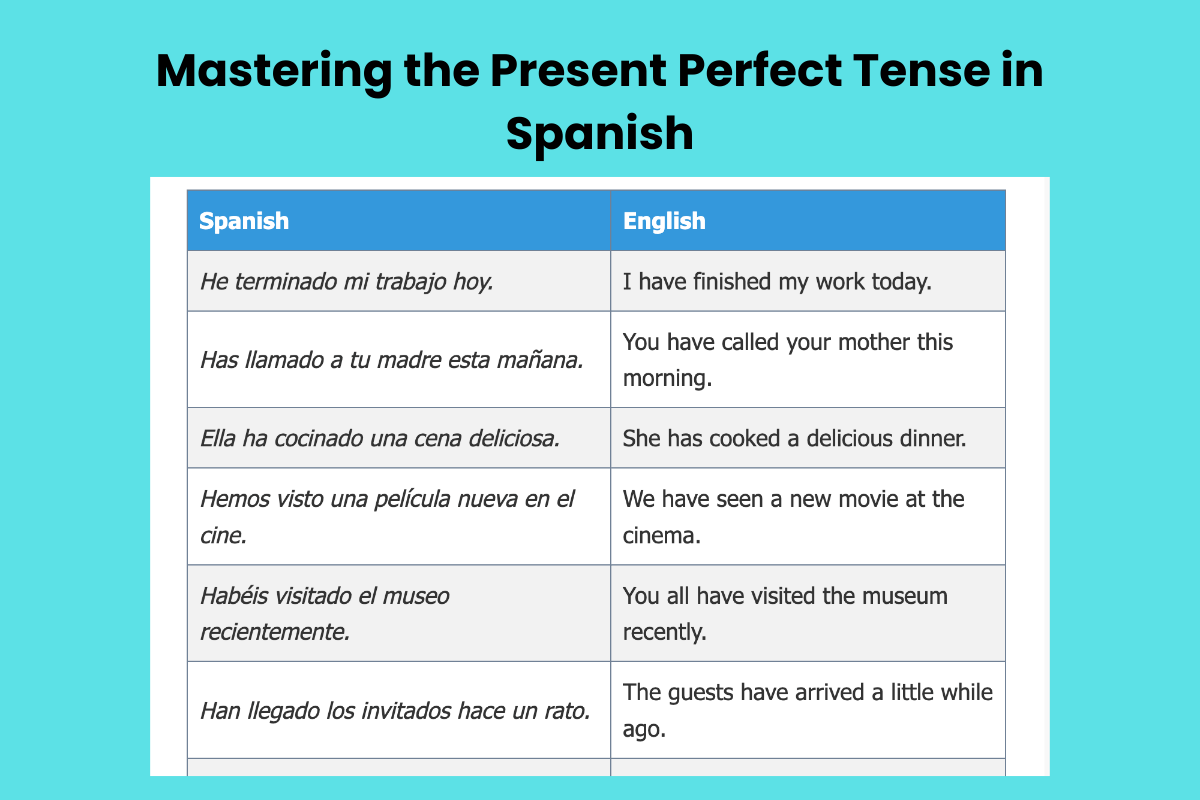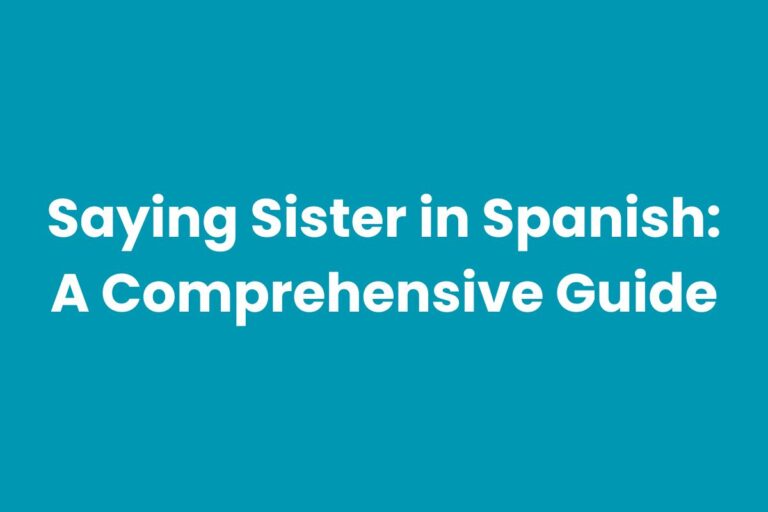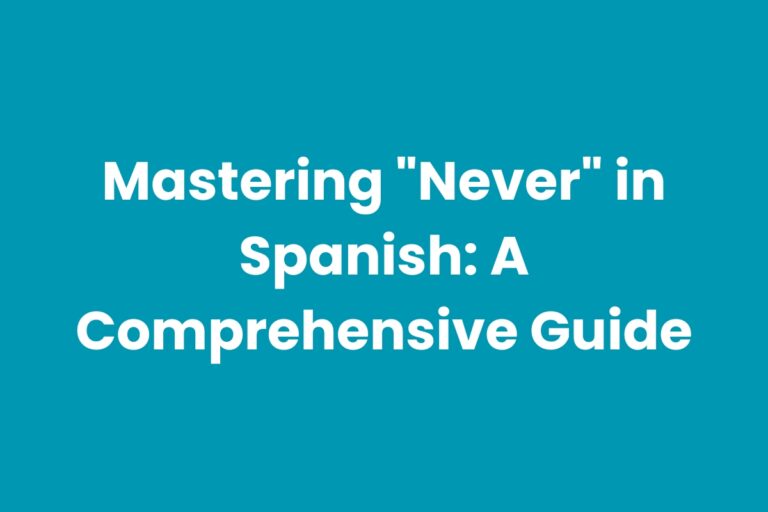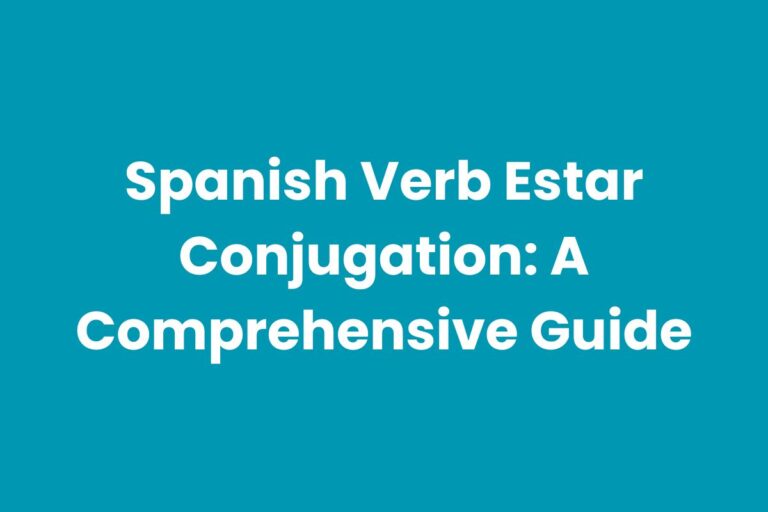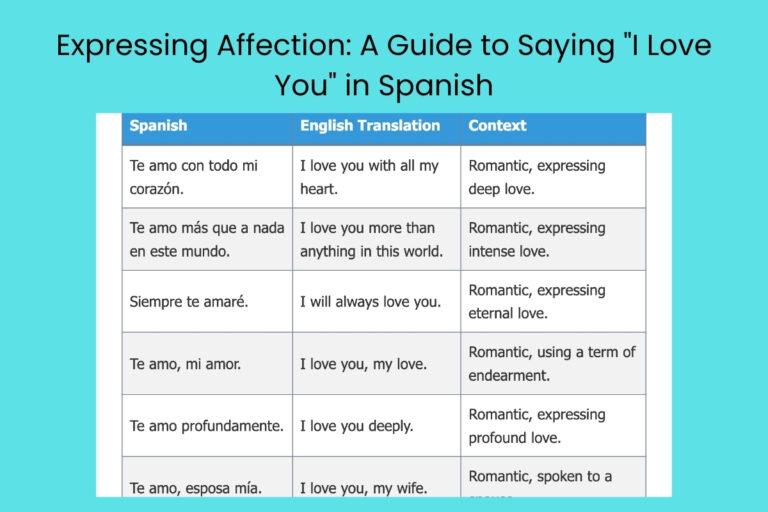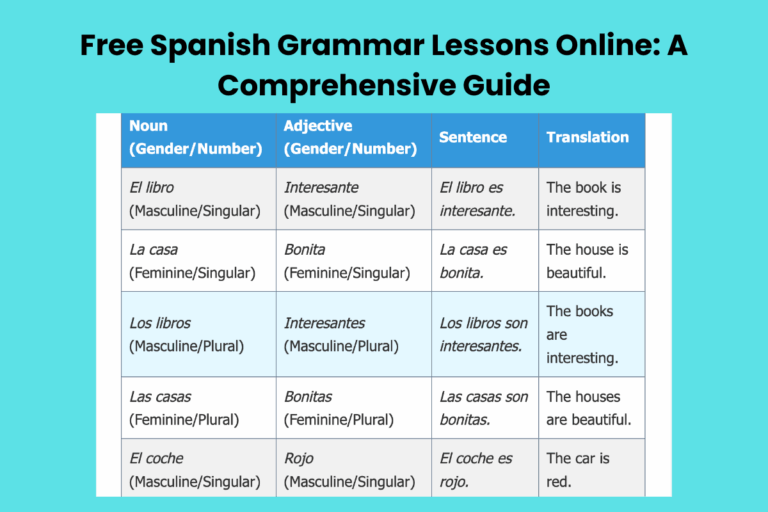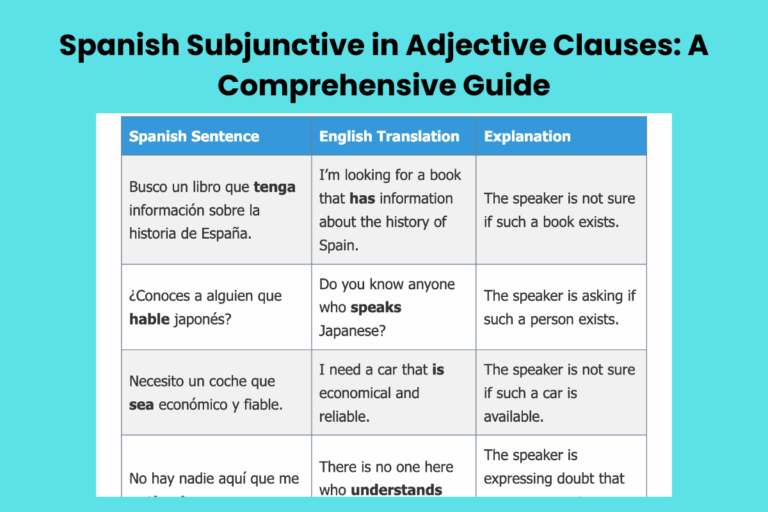Mastering the Present Perfect Tense in Spanish
The present perfect tense in Spanish, known as el pretérito perfecto compuesto, is crucial for expressing actions completed in the recent past that have relevance to the present. Understanding this tense allows you to communicate experiences, recent events, and actions that continue to affect the present moment. This guide is designed for Spanish learners of all levels, from beginners seeking a solid foundation to advanced students aiming to refine their grammar skills and achieve fluency.
This comprehensive guide will walk you through the definition, structure, usage rules, common mistakes, and advanced topics related to the present perfect tense in Spanish. With detailed explanations, numerous examples, and practical exercises, you’ll gain the confidence to use this tense accurately and effectively in your everyday conversations and writing.
Table of Contents
- Introduction
- Definition of the Present Perfect Tense
- Structural Breakdown
- Usage Rules
- Examples
- Common Mistakes
- Practice Exercises
- Advanced Topics
- FAQ
- Conclusion
Definition of the Present Perfect Tense
The present perfect tense in Spanish, or pretérito perfecto compuesto, is a compound tense used to describe actions that have been completed at some point before the present time. It connects a past action to the present, emphasizing the result or relevance of that action now. It’s formed using the auxiliary verb haber (to have) conjugated in the present tense, followed by the past participle of the main verb.
This tense is essential for conveying experiences, recent events, and actions that started in the past and continue to have an impact on the present. It is commonly used with time expressions like hoy (today), esta semana (this week), este mes (this month), alguna vez (ever), and nunca (never). However, it’s crucial to understand that the specific usage can vary across different Spanish-speaking regions.
Structural Breakdown
The present perfect tense in Spanish is formed using two key components: the auxiliary verb haber in the present tense and the past participle of the main verb. Understanding how to conjugate haber and form the past participle is fundamental to mastering this tense.
The Auxiliary Verb Haber
The auxiliary verb haber, meaning “to have,” provides the tense and person information for the present perfect. It is conjugated in the present tense as follows:
- Yo he (I have)
- Tú has (You have)
- Él/Ella/Usted ha (He/She/You have)
- Nosotros/Nosotras hemos (We have)
- Vosotros/Vosotras habéis (You all have)
- Ellos/Ellas/Ustedes han (They/You all have)
The correct conjugation of haber is crucial because it indicates who performed the action and when it occurred relative to the present.
The Past Participle
The past participle is formed by adding specific endings to the stem of the verb. For regular verbs ending in -ar, the ending -ado is added. For regular verbs ending in -er or -ir, the ending -ido is added.
Here are some examples:
- Hablar (to speak) → Hablado (spoken)
- Comer (to eat) → Comido (eaten)
- Vivir (to live) → Vivido (lived)
Many verbs have irregular past participles, which must be memorized. Some common examples include:
- Abrir (to open) → Abierto (opened)
- Decir (to say) → Dicho (said)
- Escribir (to write) → Escrito (written)
- Hacer (to do/make) → Hecho (done/made)
- Ver (to see) → Visto (seen)
- Volver (to return) → Vuelto (returned)
The past participle remains invariable in gender and number when used with the auxiliary verb haber.
Usage Rules
The present perfect tense is used in several specific contexts to convey actions completed in the recent past that have relevance to the present. Understanding these contexts is key to using the tense correctly.
Recent Past Actions
The present perfect is used to describe actions that have recently occurred and are still relevant or have an impact on the present. This often involves time expressions like hoy (today), esta mañana (this morning), or hace un rato (a little while ago).
For example:
- He comido mucho hoy. (I have eaten a lot today.)
- Esta mañana he leído el periódico. (This morning I have read the newspaper.)
Experiences
This tense is also used to talk about experiences that have happened at some point in your life, without specifying when. It is often used with expressions like alguna vez (ever) and nunca (never).
For example:
- ¿Has estado alguna vez en España? (Have you ever been to Spain?)
- Nunca he visto una película tan buena. (I have never seen such a good movie.)
Continuing Actions
The present perfect can also describe actions that started in the past and continue up to the present. This usage often involves expressions like hasta ahora (until now) and en los últimos años (in recent years).
For example:
- He vivido en esta ciudad durante diez años. (I have lived in this city for ten years.)
- Hasta ahora, he trabajado mucho. (Until now, I have worked a lot.)
Time Markers
Certain time markers frequently accompany the present perfect tense. These include:
- Hoy (today)
- Esta semana (this week)
- Este mes (this month)
- Este año (this year)
- Alguna vez (ever)
- Nunca (never)
- Ya (already)
- Todavía no (not yet)
- Últimamente (lately)
- Recientemente (recently)
Using these time markers can help clarify the connection between the past action and the present moment.
Examples
To further illustrate the usage of the present perfect tense, here are several examples categorized by the type of action they describe.
Recent Past Actions Examples
The following table provides examples of the present perfect tense used to describe actions completed in the recent past.
| Spanish | English |
|---|---|
| He terminado mi trabajo hoy. | I have finished my work today. |
| Has llamado a tu madre esta mañana. | You have called your mother this morning. |
| Ella ha cocinado una cena deliciosa. | She has cooked a delicious dinner. |
| Hemos visto una película nueva en el cine. | We have seen a new movie at the cinema. |
| Habéis visitado el museo recientemente. | You all have visited the museum recently. |
| Han llegado los invitados hace un rato. | The guests have arrived a little while ago. |
| He leído un libro interesante esta semana. | I have read an interesting book this week. |
| Has hecho ejercicio esta mañana. | You have exercised this morning. |
| Ha llovido mucho esta semana. | It has rained a lot this week. |
| Hemos estudiado español este año. | We have studied Spanish this year. |
| Habéis comprado un coche nuevo. | You all have bought a new car. |
| Han abierto la tienda hace poco. | They have opened the store recently. |
| He bebido café esta tarde. | I have drunk coffee this afternoon. |
| Has escrito un correo electrónico importante. | You have written an important email. |
| Ella ha preparado el almuerzo. | She has prepared lunch. |
| Hemos pagado la cuenta. | We have paid the bill. |
| Habéis vendido la casa. | You all have sold the house. |
| Han roto el jarrón. | They have broken the vase. |
| He vuelto a casa tarde. | I have come home late. |
| Has visto a Juan hoy. | You have seen Juan today. |
| Ella ha dicho la verdad. | She has told the truth. |
Experiences Examples
The following table provides examples of the present perfect tense used to describe experiences.
| Spanish | English |
|---|---|
| He viajado a muchos países. | I have traveled to many countries. |
| ¿Has probado la comida tailandesa alguna vez? | Have you ever tried Thai food? |
| Nunca ha esquiado. | He has never skied. |
| Hemos visitado el Museo del Prado. | We have visited the Prado Museum. |
| ¿Habéis montado en globo alguna vez? | Have you all ever ridden in a hot air balloon? |
| Han estado en Nueva York. | They have been to New York. |
| He corrido una maratón. | I have run a marathon. |
| Has cantado en un coro. | You have sung in a choir. |
| Ella ha aprendido a tocar el piano. | She has learned to play the piano. |
| Hemos escalado una montaña. | We have climbed a mountain. |
| Habéis leído este libro antes. | You all have read this book before. |
| Han visto ese espectáculo muchas veces. | They have seen that show many times. |
| He conocido a gente interesante. | I have met interesting people. |
| Has nadado en el océano. | You have swum in the ocean. |
| Ella ha ganado un premio. | She has won a prize. |
| Hemos perdido el tren. | We have missed the train. |
| Habéis roto un plato alguna vez. | Have you all ever broken a plate? |
| Han construido un castillo de arena. | They have built a sandcastle. |
| He vuelto a ver esa película. | I have seen that movie again. |
| Has dicho una mentira. | You have told a lie. |
| Ella ha puesto la mesa. | She has set the table. |
Continuing Actions Examples
The following table provides examples of the present perfect tense used to describe actions that started in the past and continue to the present.
| Spanish | English |
|---|---|
| He vivido en Madrid durante cinco años. | I have lived in Madrid for five years. |
| Has estudiado español desde enero. | You have studied Spanish since January. |
| Ella ha trabajado en esta empresa durante diez años. | She has worked at this company for ten years. |
| Hemos conocido a Juan desde la infancia. | We have known Juan since childhood. |
| Habéis tenido este coche durante mucho tiempo. | You all have had this car for a long time. |
| Han sido amigos desde la escuela. | They have been friends since school. |
| He leído muchos libros este año. | I have read many books this year. |
| Has comido saludable últimamente. | You have been eating healthy lately. |
| Ella ha dormido bien esta semana. | She has slept well this week. |
| Hemos visto muchas películas interesantes recientemente. | We have seen many interesting movies recently. |
| Habéis vivido aquí desde 2010. | You all have lived here since 2010. |
| Han trabajado duro hasta ahora. | They have worked hard until now. |
| He aprendido mucho en este curso. | I have learned a lot in this course. |
| Has visitado muchos lugares este año. | You have visited many places this year. |
| Ella ha escrito muchos poemas últimamente. | She has written many poems lately. |
| Hemos jugado al fútbol todos los domingos. | We have played football every Sunday. |
| Habéis estado muy ocupados recientemente. | You all have been very busy recently. |
| Han tenido muchos problemas últimamente. | They have had many problems lately. |
| He sido muy feliz aquí. | I have been very happy here. |
| Has tenido mucha suerte. | You have had a lot of luck. |
| Ella ha estado enferma esta semana. | She has been sick this week. |
Common Mistakes
Several common mistakes can occur when using the present perfect tense. Being aware of these errors can help you avoid them.
- Incorrect use of ser instead of haber: The auxiliary verb must always be haber, not ser.
- Incorrect: Yo soy comido.
- Correct: Yo he comido. (I have eaten.)
- Incorrect past participle form: Using the infinitive or present tense form instead of the past participle.
- Incorrect: He hablar con él.
- Correct: He hablado con él. (I have spoken with him.)
- Forgetting irregular past participles: Not memorizing and using the correct irregular past participle forms.
- Incorrect: He hacer la tarea.
- Correct: He hecho la tarea. (I have done the homework.)
- Confusing with the preterite tense: Using the present perfect when the preterite (simple past) is more appropriate. The present perfect connects to the present, while the preterite describes completed actions with no present relevance.
Here’s a table illustrating some common mistakes and their corrections:
| Incorrect | Correct | Explanation |
|---|---|---|
| Soy comido. | He comido. | Using ser instead of haber. |
| He hablar español. | He hablado español. | Using the infinitive instead of the past participle. |
| He hacer la tarea. | He hecho la tarea. | Incorrect irregular past participle. |
| He ido a España el año pasado. | Fui a España el año pasado. | Using present perfect when preterite is more appropriate. |
Practice Exercises
To solidify your understanding of the present perfect tense, complete the following exercises.
Exercise 1: Conjugation Practice
Conjugate the following verbs in the present perfect tense using the provided subject pronouns.
| Subject Pronoun | Verb (Infinitive) | Present Perfect Conjugation |
|---|---|---|
| Yo | Escribir (to write) | |
| Tú | Comer (to eat) | |
| Él | Abrir (to open) | |
| Nosotros | Vivir (to live) | |
| Vosotros | Hablar (to speak) | |
| Ellos | Hacer (to do/make) | |
| Yo | Ver (to see) | |
| Tú | Decir (to say) | |
| Él | Volver (to return) | |
| Nosotros | Poner (to put) |
Answers:
| Subject Pronoun | Verb (Infinitive) | Present Perfect Conjugation |
|---|---|---|
| Yo | Escribir (to write) | He escrito |
| Tú | Comer (to eat) | Has comido |
| Él | Abrir (to open) | Ha abierto |
| Nosotros | Vivir (to live) | Hemos vivido |
| Vosotros | Hablar (to speak) | Habéis hablado |
| Ellos | Hacer (to do/make) | Han hecho |
| Yo | Ver (to see) | He visto |
| Tú | Decir (to say) | Has dicho |
| Él | Volver (to return) | Ha vuelto |
| Nosotros | Poner (to put) | Hemos puesto |
Exercise 2: Sentence Completion
Complete the following sentences using the present perfect tense of the verb in parentheses.
- Yo __________ (visitar) París dos veces.
- Tú __________ (comer) paella alguna vez?
- Ella __________ (trabajar) mucho esta semana.
- Nosotros __________ (estudiar) español durante un año.
- Vosotros __________ (ver) esa película?
- Ellos __________ (llegar) tarde.
- Yo __________ (leer) este libro.
- Tú __________ (hacer) la tarea?
- Ella __________ (abrir) la ventana.
- Nosotros __________ (volver) a casa.
Answers:
- Yo he visitado París dos veces.
- Tú has comido paella alguna vez?
- Ella ha trabajado mucho esta semana.
- Nosotros hemos estudiado español durante un año.
- Vosotros habéis visto esa película?
- Ellos han llegado tarde.
- Yo he leído este libro.
- Tú has hecho la tarea?
- Ella ha abierto la ventana.
- Nosotros hemos vuelto a casa.
Exercise 3: Translation
Translate the following sentences into Spanish using the present perfect tense.
- I have traveled to Spain.
- Have you ever eaten sushi?
- She has lived here for five years.
- We have already seen that movie.
- You all have done a great job.
- They have finished their homework.
- I have not eaten yet.
- Have you read this book?
- He has opened the door.
- We have returned from the trip.
Answers:
- He viajado a España.
- ¿Has comido sushi alguna vez?
- Ella ha vivido aquí durante cinco años.
- Ya hemos visto esa película.
- Habéis hecho un gran trabajo.
- Ellos han terminado su tarea.
- Todavía no he comido.
- ¿Has leído este libro?
- Él ha abierto la puerta.
- Hemos vuelto del viaje.
Advanced Topics
For advanced learners, understanding the nuances of the present perfect tense in specific contexts can further enhance your fluency.
Present Perfect with Reflexive Verbs
When using the present perfect with reflexive verbs, the reflexive pronoun (me, te, se, nos, os, se) comes before the auxiliary verb haber.
For example:
- Me he levantado temprano. (I have gotten up early.)
- Te has vestido rápidamente. (You have gotten dressed quickly.)
- Se ha lavado las manos. (He has washed his hands.)
Present Perfect Subjunctive
The present perfect subjunctive is used in dependent clauses to express doubt, uncertainty, or emotion about a past action. It is formed using the present subjunctive of haber followed by the past participle.
For example:
- Dudo que haya terminado el trabajo. (I doubt that he has finished the work.)
- Espero que hayas tenido un buen día. (I hope you have had a good day.)
FAQ
- What is the difference between the present perfect and the preterite tense?
The present perfect tense connects a past action to the present, emphasizing its relevance or result now. The preterite tense, on the other hand, describes actions completed in the past with no specific connection to the present. For example, “He comido” (I have eaten) implies that I am no longer hungry, while “Comí” (I ate) simply states that I ate at some point in the past.
- When should I use the present perfect instead of the preterite?
Use the present perfect when the action has a clear connection to the present, such as recent actions or experiences that still matter. Use the preterite for actions that are clearly finished and have no present relevance. The choice can also depend on regional variations in Spanish.
- Can I use the present perfect with specific time expressions like “ayer” (yesterday)?
Generally, no. The present perfect is typically used with time expressions that indicate a period including the present, such as “hoy” (today), “esta semana” (this week), or “este año” (this year). Time expressions like “ayer” are more suited for the preterite tense.
- How do I form the past participle of irregular verbs?
Irregular past participles must be memorized. Common examples include abierto (opened), dicho (said), hecho (done/made), visto (seen), and escrito (written). There are patterns to some irregularities, but often it is best to learn them individually.
- Where do pronouns go when using the present perfect with reflexive verbs?
With reflexive verbs, the reflexive pronoun (me, te, se, nos, os, se) comes before the auxiliary verb haber. For example, “Me he lavado las manos” (I have washed my hands).
- Is the past participle invariable in the present perfect tense?
Yes, the past participle does not change in gender or number when used with the auxiliary verb haber. It remains invariable.
- How do I use the present perfect subjunctive?
The present perfect subjunctive is used in dependent clauses to express doubt, uncertainty, or emotion about a past action. It is formed using the present subjunctive of haber followed by the past participle. For example, “Dudo que haya terminado el trabajo” (I doubt that he has finished the work).
- What are some common time markers used with the present perfect tense?
Common time markers include hoy (today), esta semana (this week), este mes (this month), este año (this year), alguna vez (ever), nunca (never), ya (already), todavía no (not yet), últimamente (lately), and recientemente (recently).
- Is the use of the present perfect the same in all Spanish-speaking countries?
No, the use of the present perfect can vary across different Spanish-speaking regions. In some Latin American countries, the preterite tense is often used where the present perfect would be used in Spain. It’s important to be aware of these regional differences.
- What is the difference between “He estado” and “Estuve”?
“He estado” (present perfect) implies that you have been somewhere and that experience has some relevance to the present. “Estuve” (preterite) simply states that you were somewhere in the past with no current relevance. For example, “He estado en España” (I have been to Spain) suggests you might be talking about your travel experiences, while “Estuve en España el año pasado” (I was in Spain last year) is just a statement about last year.
Conclusion
Mastering the present perfect tense in Spanish is a significant step towards achieving fluency and accuracy in the language. By understanding its structure, usage rules, and common pitfalls, you can effectively communicate about recent events, experiences, and actions that continue to impact the present.
Remember to practice regularly and pay attention to the context in which the tense is used.
Continue to explore advanced topics such as the use of the present perfect with reflexive verbs and in the subjunctive mood to further refine your skills. By consistently applying what you’ve learned in this guide, you’ll gain the confidence to use the present perfect tense naturally and accurately in your Spanish conversations and writing.
Keep practicing, and you’ll see significant improvements in your overall language proficiency.

